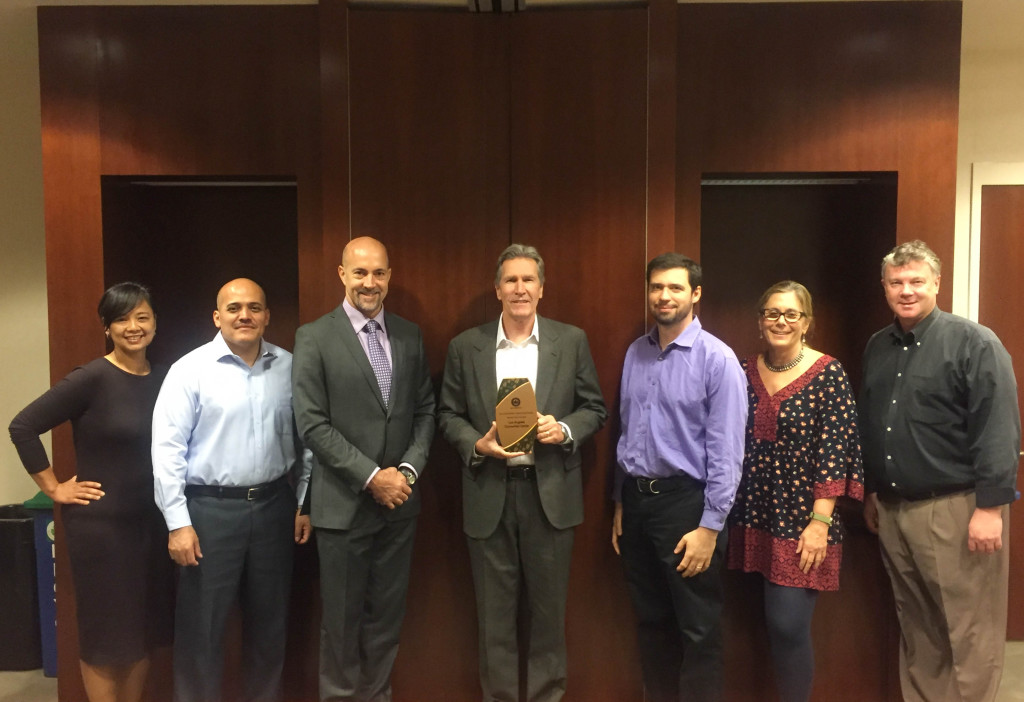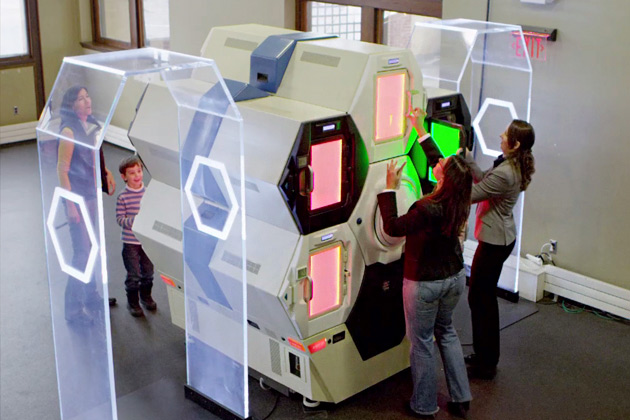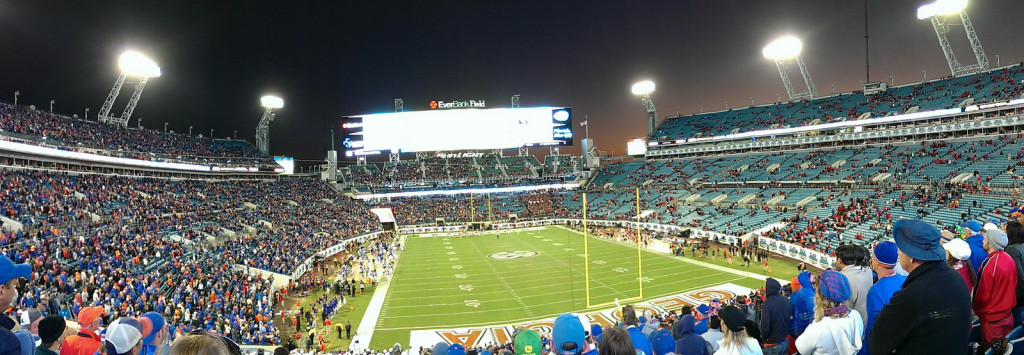Levi’s Stadium Tests New Security Entry Experience
There’s a good story on Wired.com about Levi’s Stadium testing a new entry scanner that plans to revolutionize security. It’s called the Qylatron Entry Experience Solution, and it consists of five pods.
“The process is simple, designed to improve not just security, but the entry experience,” Alex Davies wrote for Wired.com. “Hold your ticket aloft and a ticket scanner assigns you to one of five ‘pods,’ each the size of large microwave oven. Pop in your bag, close the door, and walk to the other side. By the time you get there, the machine will have scanned your stuff for any number of things, as determined by the security team. The system can handle up to 600 guests in an hour (each with one bag), and needs just four people to keep it running.”
The company that makes the product, Qylur, won’t explain exactly how it works.
“But we know it uses radiation and chemical sensors to look for explosives,” Davies wrote. “A multi-view X-ray uses machine learning to identify things like weapons, and the software can be updated to look for new threats as they’re identified. If the machine sees something it doesn’t like, it alerts a security officer and the door turns purple. If you’re good to go, the door turns green, and you use your ticket to unlock it and take your bag. You don’t have to open your bag or let anyone touch it. With five people moving through at once, you’re through security almost as quickly as you can roll your eyes.”
Depending on its success at Levi’s Stadium, the product could court other venues next year.
“We expect several more rollouts in 2016 across stadiums, amusement parks and other large public venues,” Qylur CEO Lisa Dolev told Davies.
Please visit Wired.com to learn more about the Qylatron Entry Experience Solution.
(Image: Qylur)
The Paris Attacks and the Global Venue Industry
The International Association of Venue Managers (IAVM)—representing thousands of venue managers and partner companies in stadiums, convention centers, performing arts centers, arenas, racetracks, amphitheaters, and other public assembly venues—is deeply grieved by the tragic events that took place in Paris, France, on Friday, Nov. 13, 2015.
“As IAVM members, our hearts and best wishes are with our venue brothers and sisters in Paris as well as with all of the people touched by the tragic events experienced there,” said Karen Totaro, CFE, chair of IAVM and general manager of the Atlantic City Convention Center in New Jersey. “As people who oversee a multitude of venues, much like Stade de France and the Paris Bataclan Concert Hall, we are reminded of the ever-growing need to continually assess, train, and prepare our teams and our community leaders to effectively reduce the opportunity for tragic occurrences in our own venues worldwide.”
As details emerge of the attacks, specifically at the soccer stadium, we are learning that proper safety and security training helped save lives. Rest assured, the safety and security of guests, artists, teams, and venue personnel is always of absolute top priority for our community of venue managers. Together we work hard to maintain venues that are well prepared to address every issue that potentially undermines a safe and secure environment.
In response to the Paris attacks, IAVM has been communicating with the U.S. Department of Homeland Security and industry partners such as the Association of Professional Venue Management (A-PVM) in Belgium, to gather information and appropriate updates to keep the IAVM community informed.
Los Angeles Convention Center Receives Sustainability Award

Brad Gessner, senior vice president of AEG Facilities and general manager of the L.A. Convention Center holding the award with L.A. Convention Center senior staff.
Congratulations to the AEG-managed Los Angeles Convention Center (LACC) on receiving the Sustainable Innovation Award in the Materials & Resources category at the United States Green Building Council (USGBC)-LA’s 11th Annual Green Gala. The Sustainable Innovation Awards recognizes projects across seven categories that exceed Leadership in Energy and Environmental Design (LEED) credit satisfaction and exemplify innovation, multi-tier collaboration, and positive community impact.
“We are honored and excited to have been selected as the recipient of the highly sought after Sustainable Innovation Award,” said Estella Flores, facilities manager at the Los Angeles Convention Center, in a statement. “Consistently seeking ways to improve our operations and processes in order to mitigate negative environmental impact is of utmost importance for the LACC. While we have a robust C&D [construction and demolition] program in place, we believe in on-going collaboration and will continue to refine and update the program.”
The LACC became the largest U.S. convention center to earn LEED EB+OM Gold re-certification in September 2015. The LACC Facilities and Operations Department collaborated with Waste Management to develop the Construction & Demolition (C&D) waste management program, which includes collection and hauling of the waste as well as establishing guidelines for event producers and organizers to follow in disposing of their C&D waste, the venue wrote in a press release. Within the past 12 months, the C&D program has diverted more than 1,000,000 pounds of waste from the landfill, which is a significant portion of the LACC’s overall waste.
The LACC implemented a waste management program for compostable kitchen waste, ongoing consumables, and durable goods that engages event attendees, staff, and community nonprofits. For example, the LACC partnered with the Los Angeles Conservation Corps to assist with a portion of the LACC’s ongoing consumables recycling. The Los Angeles Conservation Corps provides at-risk young adults and school-aged youth with opportunities for success through work experience on conservation and service projects. Partnering with this organization allows the LACC to simultaneously give back to the local community while reducing its environmental footprint.
“The LACC is proud to be recognized as a champion of environmental and social responsibility by the USGBC,” said Brad Gessner, senior vice president of AEG Facilities and general manager of the LACC. “The Sustainable Innovation Award celebrates our efforts in an important category but environmental best-practices are present in every aspect of our operations at the facility. We strive to be an exemplary, green facility both in L.A. and in the convention center industry at large.”
(Story source: LACC news release)
TrendWatch: Giant Robot Battles
Move over monster trucks. Fighting giant robots plan to battle in arenas and stadiums in the future.
According to the Associated Press (AP), Oakland, California-based Megabots Inc. built a 15-foot robot called the Mark II and challenged Tokyo-based Suidobashi Heavy Industries, creator of the 13-foot Kuratas robot, to a battle. Suidobashi accepted the challenge, though a date and location have yet to be determined.
Still, Megabots wants to make robot battles a recurring event.
“The Megabots founders envision a sports league where teams from around the world build huge humanoid robots that throw each other down in stadiums filled with screaming fans,” Terence Chea reported for AP.
No matter the outcome, the real winners will be the fans.
“Everyone wins as long as there is robot carnage,” Megabots co-founder Matt Oehrlein, an electrical engineer, told Chea. “People want to see these things fight. They want to see them punch each other, they want to see them ripped apart and they want to be entertained.”
Check out the video below to see the Mark II robot.
(Image: Ariel Waldman/Creative Commons)
Jacksonville Jaguars Partner with Uber
The Jacksonville Jaguars have partnered with Uber to become the first professional sports team to provide in-app access to promotion-priced tickets for fans using Uber to go to EverBank Field on game days. The initiative begins November 19.
“With Uber, we’ve created an integrated solution to the seating and transportation needs of Jaguars fans,” said Steve Ziff, Jaguars vice president of marketing and digital media, in a statement. “It’s a convenient ticket purchase and safe ride wrapped into one quick and easy transaction.”
According to a Jaguars’ press release, fans going to EverBank Field can access the Uber app on any smartphone and select the Jaguars paw print icon. Upon setting a pickup location, fans are then prompted to select up to four, lower level tickets at a promoted rate and “will be billed directly through Uber. Account holders will receive a confirmation message which can be presented at ticket will-call with a valid ID upon drop-off at EverBank Field.”
It is because of Uber’s forward-thinking partnership with the Jaguars that it is possible for the team to offer tickets at a promotional price, said Chad Johnson, Jaguars senior vice president of sales and service, in a statement.
“For last minute-decision makers not wanting to miss out on the excitement at EverBank Field, it’s a cost-effective choice to get downtown and into the game,” Johnson said.
(Image: Donna McGraw/Creative Commons)
Do you want to receive a Front Row News weekly digest?
Categories
- Allied (861)
- Architecture (147)
- Arenas (750)
- Career (897)
- Convention Centers (897)
- Education (623)
- Events (1,544)
- Food & Beverage (193)
- Foundation (113)
- Guest Experience (1,497)
- Industry News (2,270)
- Leadership (1,888)
- Marketing (150)
- Membership (2,001)
- Music (213)
- Performing Arts Centers (456)
- Professional Development (409)
- Research (128)
- Safety & Security (442)
- Sports (764)
- Stadiums (611)
- Student (159)
- Technology (516)
- Ticketing (92)
- Touring (82)
- Trends (365)
- Uncategorized (699)
- Universities (218)
- Video (25)
- Young Professional (198)
Twitter Feed
- Twitter feed loading
Recent Posts
- Monumental Sports & Entertainment Introduces Creative Council to Curate an Immersive Artistic Vision at the Brand-New Arena
- IAVM Online Is Here
- Simpleview Welcomes Industry Veteran, Evelyn Ingram, to Newly Created Venue Digital Strategy Role
- ‘Another One’ for Nicholas Family of Companies: Firm to Break Ground on Elk Grove Ice Arena in Suburban Chicago
- Venue Sustainalytics Launches Website for First-Ever Sustainability Benchmarking Platform for Event Venues
Categories
- Allied
- Architecture
- Arenas
- Career
- Convention Centers
- Education
- Events
- Food & Beverage
- Foundation
- Guest Experience
- Industry News
- Leadership
- Marketing
- Membership
- Music
- Performing Arts Centers
- Professional Development
- Research
- Safety & Security
- Sports
- Stadiums
- Student
- Technology
- Ticketing
- Touring
- Trends
- Uncategorized
- Universities
- Video
- Young Professional
Archives
- August 2025
- July 2025
- June 2025
- May 2025
- April 2025
- March 2025
- February 2025
- January 2025
- December 2024
- November 2024
- October 2024
- September 2024
- August 2024
- July 2024
- June 2024
- May 2024
- April 2024
- March 2024
- February 2024
- January 2024
- December 2023
- November 2023
- October 2023
- September 2023
- August 2023
- July 2023
- June 2023
- May 2023
- April 2023
- March 2023
- February 2023
- January 2023
- December 2022
- November 2022
- October 2022
- September 2022
- August 2022
- July 2022
- June 2022
- May 2022
- April 2022
- March 2022
- February 2022
- January 2022
- December 2021
- November 2021
- October 2021
- September 2021
- August 2021
- July 2021
- June 2021
- May 2021
- April 2021
- March 2021
- February 2021
- January 2021
- December 2020
- November 2020
- October 2020
- September 2020
- August 2020
- July 2020
- June 2020
- May 2020
- April 2020
- March 2020
- February 2020
- January 2020
- December 2019
- November 2019
- October 2019
- September 2019
- August 2019
- July 2019
- June 2019
- May 2019
- April 2019
- March 2019
- February 2019
- January 2019
- December 2018
- November 2018
- October 2018
- September 2018
- August 2018
- July 2018
- June 2018
- May 2018
- April 2018
- March 2018
- February 2018
- January 2018
- December 2017
- November 2017
- October 2017
- September 2017
- August 2017
- July 2017
- June 2017
- May 2017
- April 2017
- March 2017
- February 2017
- January 2017
- December 2016
- November 2016
- October 2016
- September 2016
- August 2016
- July 2016
- June 2016
- May 2016
- April 2016
- March 2016
- February 2016
- January 2016
- December 2015
- November 2015
- October 2015
- September 2015
- August 2015
- July 2015
- June 2015
- May 2015
- April 2015
- March 2015
- February 2015
- January 2015
- December 2014
- November 2014
- October 2014
- September 2014
- August 2014
- July 2014
- June 2014
- May 2014
- April 2014
- March 2014
- February 2014
- January 2014
- December 2013
- November 2013
- October 2013
- September 2013
- August 2013
- July 2013
- June 2013
- May 2013
- April 2013
- March 2013
- February 2013
- January 2013
- May 2012
- March 2012
- December 2011
- November 2011
- October 2011
Recent Comments
- Frank Bradshaw, Ph.D., CVE on John Meyer, CVE, a Tireless Advocate of Certification for Venue Professionals, Has Died
- Neil Sulkes on Hilary Hartung, Friend to Many in Venue Marketing, Has Left Us
- Jason Parker, CVE on The Devastation of Hurricane Helene and How We Can Support One Another
- Larry Perkins on Touhey Testifies Against Speculative Ticketing Before Congressional Subcommittee
- Peter Secord on Major Players for Planned Elkhart Amphitheater Were in the Mix at VenueConnect




